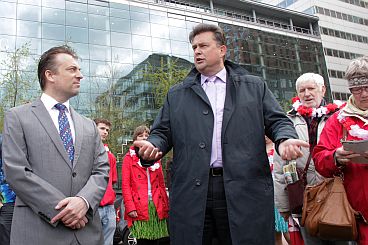SP launches attack on international tax evasion
SP launches attack on international tax evasion
On Friday, during the first SP Tax Free Tour, SP Member of Parliament Arnold Merkies presented eight proposals designed to tackle international tax evasion. The aim of the proposals is to prevent corporations registering themselves in the Netherlands with the sole purpose of evading taxes, as well as to see the international approach to tax evasion strengthened.

During the tour in Amsterdam a range of speakers demonstrated the important role played by the Netherlands in making tax evasion possible, as Merkies explains. ‘With more than 20,000 postbox companies, as they are known, and a sum of more than €8,000 billion flowing through the Netherlands each year, our country is a real tax haven for multinationals. Crisis-hit states such as Portugal and Greece - but also developing countries - lose billions in tax revenues through this because firms from these countries transfer their money to the Netherlands. Apart from the enormous social damage done in these countries themselves, the Dutch taxpayer is also hurt by this sort of practice, so this perverse role played by the Netherlands must end.’

Speakers on the tour of major tax evaders with a bogus establishment in Amsterdam included financial experts from the media and the academic world as well as the SP’s Euro-MP Dennis de Jong, who explained what the European Union could and should be doing to combat corporate tax evasion.

Arnold Merkies and Rodrigo Fernandez (left)
Below is a summary of the SP’s proposals.
TOWARDS A FAIRER LEVEL OF TAXATION FOR ALL
The crisis has greatly increased the attention paid to international tax evasion. For many people it’s hard to stomach the fact that their own taxes have increased while corporations and rich individuals seize every means to contribute as little as possible to state finances. Every year in Europe thousands of billions in euros in tax is dodged or evaded. That’s so much money that the deficits of many states would evaporate if these corporations would simply pay the taxes they are supposed to pay.
The Netherlands plays an important role in making possible international tax constructions by means of which multinationals evade taxes on a global scale. If we want to tackle tax evasion then the Netherlands should instead be playing a pioneering role.
Yet this can only be achieved if we look critically at our own behaviour. It’s time that multinationals began to contribute a fair share of state expenditure instead of the ordinary taxpayer and small businesses having to cough up. Below, the SP presents eight proposals which we believe deserve to be an absolute priority if we are to achieve a just level of taxation for everyone.
1. DO SOMETHING ABOUT POSTBOX COMPANIES
With more than 20,000 box number companies and a sum in excess of €8,000 billion pouring out of the Netherlands each year, our country is a tax haven for multinationals. An end must be put to this, by, amongst other things, tightening up on what are known as ‘tax rulings’. These provide clear information to corporations in advance as to the amount they will pay in tax, and the Netherlands now imposes extremely feeble demands. It’s even possible for a firm to be eligible for this when it employs nobody at all in the country. The tax service should not be joining forces with corporations which exist only on paper and make no real contribution to the economy.
2. MAKE AMOUNT OF TAX PAID TRANSPARENT
When a firm operates on the national level it’s clear how much they contribute to the treasury. Multinationals, on the other hand, have only to declare how much tax they pay globally. The SP wants to see corporations obliged to state in their annual reports how much tax they pay per country, which would make it easier to see whether a particular piece of legislation or an international agreement needs to be adjusted.
3. TIGHTEN UP THE INTERNATIONAL DEFINITION OF A TAX HAVEN
The OECD definition used by the Netherlands could be used to construct a list of countries seen as tax havens, but this definition is in fact so weak that not a single country would appear. That’s why the SP wants to see a real definition which at least covers countries where no or almost no tax is levied, those where hardly any information is exchanged and which offer all kinds of possibilities for establishing exotic tax constructions. Money pouring into tax havens should be subject to a levy to prevent a situation in which no tax whatsoever is paid.
4. REVISE THE NETHERLANDS’ TAX TREATIES
The Dutch state has an extensive network of tax treaties with other countries, many of them tax havens. No further treaties with tax havens should be agreed, while existing agreements of this kind must be forcibly reopened to negotiation of new accords on imposing taxes at source, automatic exchange of data and countering damaging tax constructions. Measures to prevent abuse must become a standard feature of all such finalised treaties.
5. END BANK SECRECY
There remain countries which distribute no information regarding the amounts held in bank accounts. In practice countries will only change this under pressure, so it’s important to exert such pressure on the international level.
6. STOP STEALING TAXES FROM DEVELOPING COUNTRIES
The biggest losers from international tax evasion by multinationals are the developing countries, which are estimated by Oxfam to lose €460 million p.a. from firms diverting moneys via the Netherlands alone. Our country’s tax treaties should therefore be assessed as to the impact they have on developing countries and amended accordingly. The OECD’s model tax treaty is inadequate to combat this, and it would be better to base revised or fresh treaties on the UN model treaty, which strengthens the position of countries on whose territory a firm is active.
7. USE INTERNATIONAL COOPERATION TO HALT TAX COMPETITION
Tax competition means that countries allow themselves to be played off against each other by international big business, lowering tax rates ever further and introducing new laws which undermine the tax base. This race to the bottom means that governments have to impose spending cuts affecting important services such as health care, education and social security. This could be halted by means of international agreements on a minimum rate and minimum basis for corporation taxes.
8. ESTABLISH AN INTERNATIONAL INFORMATION CENTRE ON TAX COMPETITION
An independent international information centre on tax competition should be set up to look into damaging tax constructions and the consequences of international tax competition, and to enable countries to pass on advice as to how to prevent tax evasion, especially to countries where such knowledge is lacking.
